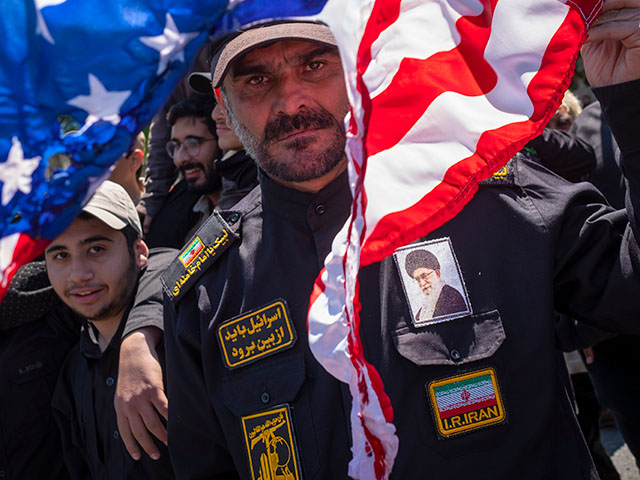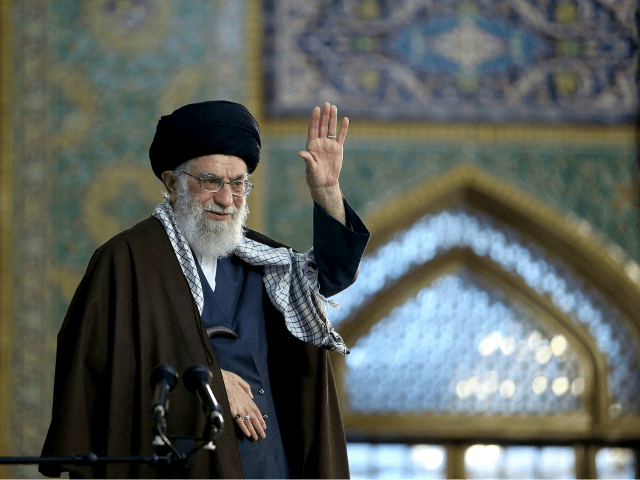Iranian dictator Ayatollah Ali Khamenei celebrated the demise of “the arrogant power of America” in a speech in Tehran on Monday, the 22nd anniversary of the September 11 attacks on the U.S. homeland by radical Muslim terrorists.
Khamenei’s remarks, in which he celebrated that America “has weakened and will become weaker,” preceded a report by the Associated Press claiming on Monday that leftist American President Joe Biden agreed to waive sanctions on third-party countries to allow the transfer of $6 billion in frozen funds to Iran out of banks in South Korea – a further concession as part of a prisoner swap first reported in early August.
The initial reports on the deal suggested that the Iranian terrorist state would release five Americans in exchange for a “handful” of Iranian convicts in America and $6 billion, but the Americans in question have only been released out of the country’s notorious Evin prison into house arrest and are reportedly not free at press time. The reports, citing the Iranian mission to the United Nations, claimed the money would travel from South Korean banks to Qatar. The concessions reported on Monday are reportedly meant to facilitate that transfer by not punishing banks aiding the transfer for violating existing sanctions.
“This is not a ransom,” White House National Security Council Coordinator for Strategic Communications John Kirby insisted in August.
Khamenei’s remarks on Monday did not mention the reported $6 billion agreement, nor did they dwell on the September 11, 2001, attacks. The “supreme leader” instead warned Iranians to fear alleged American “plots” to undermine the Islamic “revolution” but claimed such schemes were the last gasps of a dying power.

An Iranian protester wearing a fake military uniform with a portrait of Iran’s Supreme Leader Ayatollah Ali Khamenei, and a Persian script (L top) that reads, Israel must be destroyed, while standing behind a burnt U.S. flag during a rally commemorating the International Quds Day, also known as the Jerusalem day, in Tehran, April 14, 2023. (Morteza Nikoubazl/NurPhoto via Getty)
“The arrogant power of America and some European countries has weakened and will become weaker,” Khamenei said, according to Iran’s PressTV state propaganda outlet. Khamenei claimed the world was in the process of “transformation” away from the era of America being the world’s dominant superpower.
“The main lines of this transformation are several things: First of all, the weakening of the world’s arrogant powers,” Khamenei claimed. “They themselves say that the indicators of American power in the world like economy are declining. One of the most important indicators of American power was the strong American economy; they say it is declining.”
“America interfered in various governments, but the condition is now declining,” the cleric continued. “Today, America has to create a combined war in order to hit the governments that it wants to hit, which is very costly for it, and will not work out in the end.”
“Day by day, new powers are rising; this is a great global change,” Khamenei celebrated.
Despite the alleged “great global change,” Khamenei claimed that America remained a threat to Tehran through alleged “plots” to use human rights issues to turn the Iranian people against their repressive leaders.
“Today, the US has plans in the region for Iraq, Syria, Lebanon, Yemen, Afghanistan and even for the countries of the Persian Gulf, which are its old and traditional friends,” Khamenei said, offering no evidence for these claims or expanding on what those “plans” entail.
WATCH: Iran Speedboats Close on U.S. Navy Warship
U.S. Naval Forces Central Command / U.S. 5th FleetIn Iran, he continued, America’s support for human rights – particularly anti-regime protests in the aftermath of the brutal killing of 22-year-old Mahsa Amini for allegedly wearing a hijab improperly – was an attempt to exploit “crisis points” in the country to topple the regime.
“When we say the enemy is becoming weak, it doesn’t mean that it cannot plot, be hostile and strike, it can,” Khamenei continued. “They are busy planning, we should not slumber, we should not be negligent.”
Khamenei made his declarations on the anniversary of the September 11, 2001, terrorist attacks, which killed over 2,700 people immediately and continue to kill Americans through related illnesses. American courts have held Iran accountable for offering aid and, potentially, training to the jihadists who orchestrated the attack. In 2018, an American judge ordered the Iranian Islamic regime to pay $6 billion – the same amount as that frozen in South Korean banks – to the families of victims of the September 11 attacks as a result of Tehran’s “material support” to al-Qaeda, the Sunni terrorist organization responsible.
Khamenei’s warnings to Iranians to consider America a dangerous enemy despite its alleged downfall also came on the same day that the Associated Press reported that the Biden administration had agreed to a one-time deal not to hold countries accountable for violating sanctions if they helped Iran transfer $6 billion out of South Korean banks, where the assets had been frozen as a result of sanctions imposed on the world’s most prolific state sponsor of terrorism. International banks helping the money flow from South Korea to Qatar, a reliable Iranian ally, would not face consequences for handling Iranian money contrary to sanctions, according to the report.
Reports of the Biden administration considering freeing the $6 billion to Iranian custody in exchange for freeing five Americans imprisoned in the country surfaced initially in August. The Associated Press claimed that the Biden administration did not tell Congressional leaders about the sanctions waivers until September 11.
Hours before the Associated Press report was published, State Department spokesman Matthew Miller told reporters that deals to liberate Americans imprisoned in Iran were “ongoing.”
“We continue to work towards the full release of the American citizens that were detained in Iran, that have now moved on to house arrest. I don’t have any update on timing for ultimate resolution,” Miller said.
The Biden administration had not previously confirmed any deals in particular regarding the five Americans – identified in August as Siamak Namazi, Emad Sharghi, and Morad Tahbaz, and two other unnamed prisoners in a New York Times report. Administration officials had instead acknowledged that the prisoners were moved out of Evin prison, a facility notorious for torturing political prisoners, and into house arrest. The individuals are believed to still be under house arrest at press time.
Iran issued death threats against Israel, the U.S. & the UK as the country celebrated the 43rd anniversary of the Islamic Revolution. https://t.co/i2VXGJ3QI6
— Breitbart News (@BreitbartNews) February 11, 2022
“While this is an encouraging step, these U.S. citizens — Siamak Namazi, Morad Tahbaz, Emad Shargi, and two Americans who at this time wish to remain private — should have never been detained in the first place,” said National Security Council (NSC) spokeswoman Adrienne Watson said in August. “We will continue to monitor their condition as closely as possible. Of course, we will not rest until they are all back home in the United States.”
The deal also reportedly includes the release of Iranian citizens convicted of crimes, some of them sanctions violations, and imprisoned in America. The number and identity of those Iranians remains unconfirmed at press time.
Both Washington and Tehran have insisted that the billions sent to Iran were not a “ransom” payment for the Americans. Multiple Iranian officials have claimed the money had nothing to do with the prisoners at all.
“The exchange of prisoners is a completely humanitarian issue and has nothing to do with unblocking our funds in foreign banks,” Iran’s Foreign Minister Hossein Amir-Abdollahian alleged in August.
The Iranian state-run PressTV outlet also cited Kazem Gharibabadi, secretary of Iran’s High Council for Human Rights, “roundly dismiss[ing]” any ties between the prisoners and the money.
Joe Biden has already reached an "unwritten" nuclear deal with Iran, leaving Israel unable to act independently to defend itself. https://t.co/Zy9o9eaWmO
— Breitbart News (@BreitbartNews) July 14, 2023
Similarly, Kirby, the White House spokesman, insisted on CNN in August that the money was “not a ransom.” He also claimed, contrary to the subsequent report on Monday, that “there’s not going to be sanctions relief” in relation to the negotiations.
“There’s not going to be a ransom payment. There’s not going to be sanctions relief,” Kirby asserted.
“This is not a ransom,” he repeated, apparently blaming the previous administration of former President Donald Trump for the $6-billion bank account existing.
“[I]t’s important to remember that the account from which money could be accessed by the Iranians is an account set up in the previous administration that allowed other countries to import non-sanctionable goods,” he claimed. “It’s not something that the Biden administration created, but it’s a series of accounts that Iran has pulled on before.”
The Associated Press, contrary to both Iranian and American officials, claimed the billions in South Korea were the “critical element in the prisoner release deal.”
Follow Frances Martel on Facebook and Twitter.

COMMENTS
Please let us know if you're having issues with commenting.